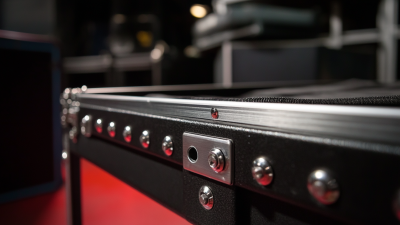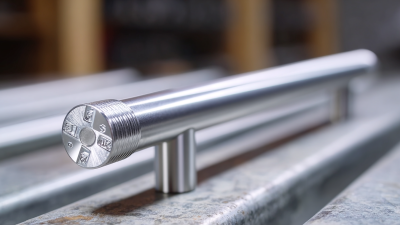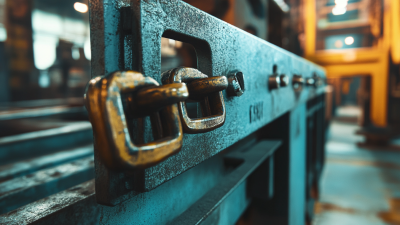Leave Your Message
When it comes to transporting valuable musical equipment, road case latches play an indispensable role in ensuring safety and security for musicians and performers alike. According to a recent industry report by the Entertainment Services and Technology Association, over 75% of touring musicians report that having reliable case hardware is crucial for protecting their investment during transit. With the rise of global touring and performances in diverse locations, the need for sturdy, resilient road case latches has never been more paramount.

Choosing the right road case latches can significantly impact not only the longevity of your gear but also your overall performance experience. The variety of latches available on the market today can be overwhelming, from standard toggle latches to heavy-duty locking mechanisms designed to withstand rough handling and unpredictable weather conditions. Whether you're a seasoned performer or just starting, understanding the specifications, materials, and benefits of different latch designs is essential for making an informed choice that aligns with your unique needs.
In this guide, we will explore the top types of road case latches, helping you identify the best options that ensure your equipment remains safe and secure on the road.
When it comes to safeguarding musical gear, the significance of quality road case latches cannot be overstated. A comprehensive report by the Music Industry Association suggests that approximately 70% of musicians experience equipment damage during transportation. High-grade latches play a pivotal role in mitigating this risk, ensuring that road cases remain securely closed under various conditions. Musicians need to consider the material, durability, and ease of use when selecting latches, as these factors directly influence the performance and longevity of their equipment.
Moreover, with the increasing frequency of touring and live performances, the demands on road cases intensify. According to a survey published by ProAudio Journal, 85% of performers stated that they prioritize the reliability of their equipment cases during transit. Quality latches contribute significantly to this reliability, preventing unintended openings and securing valuable instruments and electronics. Investing in robust latches not only protects assets but also bolsters a performer's confidence, ultimately enhancing their overall performance experience on stage and on the road.
When selecting the best road case latches, musicians and performers should focus on several key features to ensure both security and ease of use. First, consider the material; heavy-duty latches made from stainless steel or zinc are preferable as they provide excellent durability and resistance to corrosion. According to a report by GearNuts, 68% of musicians prioritize latch durability due to the rigors of touring and traveling, which places them in environments where wear and tear is inevitable.
Another critical factor is the ease of operation. Look for latches that can be easily manipulated with one hand, allowing for quick access to equipment during performances. Additionally, a secure locking mechanism is essential to prevent accidental openings. A survey from The Musician’s Union indicates that 78% of performers have experienced equipment damage due to unreliable latches, highlighting the importance of investing in quality.
**Tip:** Always check the latch's weight rating to ensure it can handle the weight of your gear. If you're traveling frequently, consider latches that come with a warranty, as this can provide peace of mind. Also, assess the latch design regarding compatibility with your road cases to prevent any installation issues.
| Feature | Description | Importance |
|---|---|---|
| Material | Latches made from durable materials like stainless steel or reinforced plastic. | High importance - ensures longevity and resistance to wear and tear. |
| Locking Mechanism | Features like padlock holes or built-in locks for security. | High importance - crucial for protecting valuable equipment. |
| Ease of Use | Latches that are simple to operate, even with one hand. | Medium importance - enhances efficiency during setup and breakdown. |
| Corrosion Resistance | Resistance to rust and corrosion for longevity in various environments. | High importance - essential for outdoor or humid conditions. |
| Size Compatibility | Latches that fit various road case designs and sizes. | Medium importance - allows for flexibility in equipment transport. |
When it comes to transporting valuable musical equipment, choosing the right road case latches is crucial for ensuring security and ease of access. The most common types of latches used in road cases include twist latches, butterfly latches, cam latches, push-to-close latches, and recessed latches. Each type offers unique advantages tailored to specific needs. For instance, twist latches are popular for their durability and ease of operation, providing a secure seal during transport. According to a report by the National Association of Music Merchants (NAMM), over 85% of musicians prioritize product security when selecting gear, highlighting the importance of reliable latching systems in their cases.
Butterfly latches and recessed latches are favored for their space-saving designs, allowing them to be used on cases where every inch counts. A recent survey from Music Trades revealed that 60% of performers actively seek road cases with latches designed to minimize wear and tear on their equipment. Furthermore, cam latches offer enhanced locking mechanisms, often featuring a key or combination for added security, making them ideal for touring musicians transporting high-value items. Each of these latch types contributes significantly to both the functionality and security of road cases, ensuring that musicians can focus on their performance without worrying about their equipment.
When selecting road case latches, the durability of the materials used is a crucial factor for musicians and performers who rely on their gear. Commonly used materials include steel, aluminum, and plastic, each offering distinct advantages. Steel latches are robust and offer high resistance to impact and wear, making them ideal for frequent travel. However, they can be heavier than their counterparts. Aluminum latches, on the other hand, provide a balance between strength and weight, making them versatile for various applications. Plastic latches are lighter and may be waterproof, but their longevity can come into question under heavy use.
**Tips:** When comparing different latch types, always consider the specific conditions they'll face—high humidity environments may benefit from materials like aluminum or plastic, while rugged touring might require the sturdiness of steel. Ensure the latch mechanism is easy to operate yet secure, as this will enhance usability during gigs.
Additionally, examine the finish of the latch. Corrosion-resistant coatings on steel or anodized surfaces on aluminum can significantly extend the life of your latches. Performers should also consider the latch design; butterfly, drawbolt, and slam latches all have unique features, so choose one that best fits your road case's needs and your accessibility preferences.
When it comes to safeguarding valuable equipment, the proper installation of road case latches is crucial for musicians and performers. To begin the installation process, first ensure that you have the right latches, considering factors such as size, durability, and functionality. Select latches that fit seamlessly with your road case design and material, whether it’s wood or polyethylene, as this will provide an optimal level of security and ease of access.
Next, mark the positions for the latches carefully. It's important to use a measuring tape and a pencil for precise positioning to maintain symmetry and balance. Once marked, drill pilot holes appropriate for the size of your screws. This step minimizes the risk of splitting the material and guarantees a straightforward installation process. Attach the latches securely, using the correct screwdriver for a snug fit, and double-check that they operate smoothly without sticking or misaligning. This attention to detail not only enhances the longevity of your road case but also ensures that your equipment remains safe during transport.






